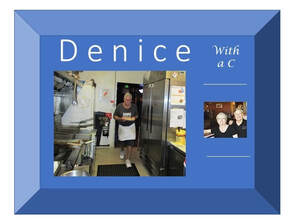
There are snarky jokes about lawyers. There are severe phobias about dentists. But the professional person who strikes a dagger of dread deep into my soul is that well-known link between me, you and most people lucky enough to purchase a new home. I am talking, of course, about realtors. I know that among their ranks are some of the finest, smartest, most hard-working folk any of us will ever know. The fact that I’ve yet to meet one like that does not, in any way, diminish the existence. And the one I enlisted to help find my new domicile in my new town had a truly positive effect on my life. Without him, I never would have wandered into a diner called “Andy’s Café” after a long day on the hunt for a house, when I sunk down at a little corner table, and unloaded my plight on a waitress who gave me the thing I most needed at that very moment: a cup of coffee and a dose of encouragement. And that’s how I met Denice with a C.
“Hiya,” she said. “You look like you could use this.” And right then and there, in Andy’s Café, my new small-town life started to turn a corner. Never without a smile and a warm curiosity about everyone in the place, Andy’s Café in general, and Denice in particular, was the first stop on my way to feeling like I had a new home -- even though it took me a long time to find an actual house. Denice and that café, glowing with cheer on dark days.
And, as realtors go, the one I had was pretty nice – but he was strangely casual, never pushing me toward the dotted line. He just drove me around, checking his watch once in a while. When I finally asked him why time was of such essence, he explained that a big game was coming up.
This would prove a recurrent theme. Big games here are right up there with milestone birthdays and pay raises for many people. Perhaps unsurprisingly, his apparently relaxed attitude towar house-hunting yielded no success. I did write up bids on two houses. For the first, an oily substance in the yard necessitated special removal and the owner thought the cost should be added to our purchase price; In the second, an imminent foreclosure of the home prompted us to make an offer a bit below the asking price. But because we’d been Californians, and thus obviously filled to the gills with money, we were turned away. Soon I abandoned the hunt, and I was no longer interfering with game days. But I was learning all about them nonetheless …
Thank goodness for Denice, co-owner of that friendly diner. It was she who warned me that I could not, under any circumstances, keep telling people that the name of Oregon’s biggest football game was called by a historically insulting term that should -- undeniably and immediately – be deep-sixed. I am referring to the three-word title known as “The Civil War.” No, not the one with Abe Lincoln and a divided country. The one between the University of Oregon and Oregon State University.
If you are hermit in a cave on Mount Hood in Oregon, maybe you don’t know that this is serious, this gridiron fight between “the ducks” and “the beavers.” And just about every person I’ve met is one or the other: Duck or Beaver. This football rivalry is so intense that when I took of tour of Portland, which included city blocks featuring native wildlife statuary, I was told by the guide that the sculptor took real heat for making the ducks a cluster of waterfowl that outnumber the beavers.
I cannot remember if Denice was a duck or beaver, but whatever it was, it was not the animal favored by her husband and co-owner of the diner, Andy Scott. Their banter about this difference was like a comedy routine. I grew to love those visits to Andy’s Café so much. So how are YOOOOOO? Denice would say. And sometimes, if her team was doing well or she hadn’t seen me for a while, she’d do a little happy bounce, which I called her “sunshine shuffle.
When I told Denice that I prefer a conversation with my attorney or root-canal surgery to the search for a new house by car with real-estate agent, she urged me to go online. This was more than 10 years ago, when, to me, it seemed like something only Millennials would do. But it worked like a charm. Meanwhile, Denice and Andy prospered, moving into a larger restaurant. For a while, I blamed the fact that Denice looked more tired on her space, which required a lot more running around. Then one day she mentioned the cancer she thought she’d beaten had returned. But she’d done that once, so she’d do it again. She was sure of it.
And so she kept on working. Until one day, when she didn’t. And, after a time, it became clear to all that knew her, all those ducks and beavers she’d entertained so long with her snappy repartee about the rivalry, that Denice was not coming back. At her memorial service I tried to say how much the cate had meant to me, and how much she would be missed. But I failed in my attempt to convey the degree to which I’d feel that, even after months, even years without seeing her. Because Denice proved that there is no truth in the old maxim that everyone is replaceable. I know this now, because I knew Denice with a C, who was indispensable and so wrongly gone. I’m Anne Scheck and this one of the lessons I learned from my small town.



